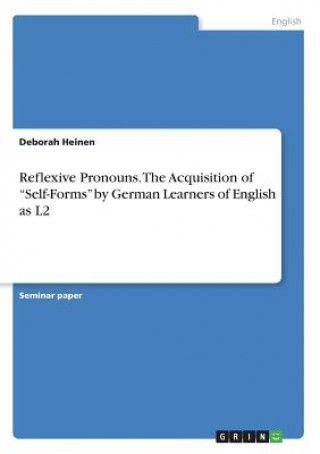
Delivery
Shopping guide





Doesn't suit? No problem! You can return within 30 days
 Gift voucher
any value
Gift voucher
any value
You won't go wrong with a gift voucher. The gift recipient can choose anything from our offer.
Reflexive Pronouns. The Acquisition of "Self-Forms" by German Learners of English as L2
 English
English
 96 b
96 b
 Delivery to Austria
Delivery to Austria
30-day return policy
You might also be interested in


Seminar paper from the year 2016 in the subject English Language and Literature Studies - Linguistics, grade: 1,0, University of Bonn, language: English, abstract: Prior linguistic knowledge - it seems plausible that the acquisition of a second language can be influenced by the learner's knowledge of structures and rules of his or her first language . Especially similarities between languages are probably tending to either facilitate the learning process or to impede it (cf. Gundel & Tarone 1994: 87). This cross-linguistic influence is called "language transfer", which can be described as negative when the application of L1 structures or rules on a L2 utterance leads to a linguistically incorrect expression (cf. Saville-Troike 2012: 19). Given the fact that similarities between languages might impede the learning process of the L2, the work in hand takes a closer look at reflexive pronouns in English and German. As "self-forms" in English and "sich-forms" in German look quite similar but differ in their use, they appear as a possible source of error for German learners of English. Therefore, the leading question of the paper is whether L2 English learners recognize the differences in the use of "self-forms" in English and the use of "sich" in German. The hypothesis is that, based on their L1 knowledge, German learners of English are likely to make use of reflexive pronouns more often than necessary. In other words, it is assumed that a negative language transfer is likely to occur due to the formal similarities between the L1 and L2. Further information on the theoretical basis of the study will be given in the second chapter, followed by the part on methodology that includes information on the informants, the research instruments, and the data collection procedure. In the following two chapters, the results of the study will be presented and, with regard to possible explanations and limitations, discussed. Finally, the main findings of the paper will be summarized. The reason for conducting this study is, in the first place, that the problem of language transfer is of great importance for the learner's learning process of English as L2. Especially teachers of English should be aware of common sources of error, so they might be able to predict possible linguistic problems and support their students at their best to avoid such mistakes (cf. Odlin 1990: 4). Furthermore, previous studies in the field of cross-linguistic examinations on reflexive pronouns mainly referred to binding conditions and the like, whereas this paper deals with the frequency and correct application of reflexives by learners of English as L2.
About the book
 English
English
Categories


 Contact
Contact How to shop
How to shop


































